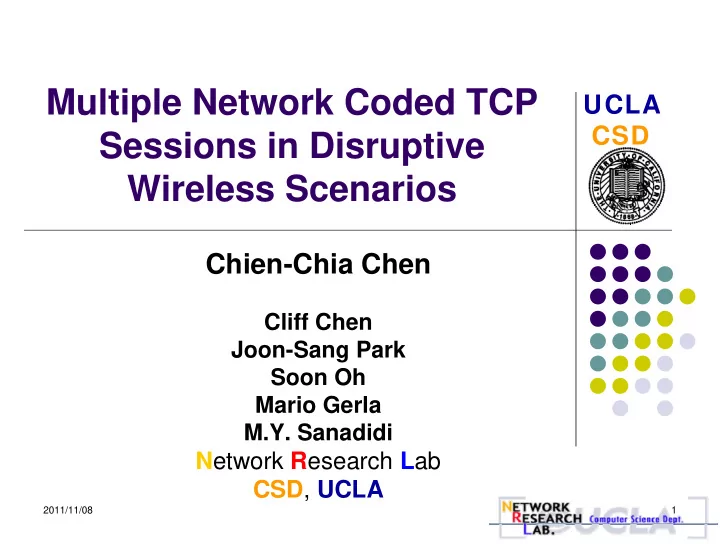

Multiple Network Coded TCP UCLA CSD Sessions in Disruptive Wireless Scenarios Chien-Chia Chen Cliff Chen Joon-Sang Park Soon Oh Mario Gerla M.Y. Sanadidi N etwork R esearch L ab CSD , UCLA 2011/11/08 1
UCLA CSD Problem Statement— Communication over Disruptive Networks 50% PACKET LOSS � Applications (streaming, TCP) mostly do not work � Sample Scenario � Military environment � Jamming, obstacles, and mobility in combat scenario � Civil environment � Obstacles and mobility in urban area 2011/11/08 2
UCLA CSD TCP Scenario Problems � 1. random losses are misinterpreted as congestion 2. TCP DATA and ACK flows contend for the same shared medium TCP DATA Random Loss X TCP ACK Source Destination 2011/11/08 3
UCLA TCP over Unstable Wireless Links CSD TCP-DATA 54Mbps Source Destination TCP-ACK 2011/11/08 4
UCLA TCP Previous Work— CSD Intra-Flow Coding � To mitigate high error rate, intra-flow coding is a known approach � Uses Random Linear Coding to recover all losses � TCP modification on both sender and receiver � Uncontrolled redundancy � Does not address TCP DATA-ACK interference TCP DATA Random Loss X TCP ACK Source Destination 2011/11/08 5
UCLA TCP Previous Work— CSD Inter-Flow Coding � To relieve TCP DATA-ACK interference � XOR-based network coding � PiggyCode � Opportunistically XOR DATA and ACK at relays � Not robust to random losses � Requires MAC layer modifications TCP DATA ♁ ACK Random Loss X TCP DATA TCP ACK Source Destination 2011/11/08 6
UCLA TCP Scenario— CSD Proposed Solution TCP DATA ♁ ACK Random Loss X TCP DATA TCP ACK Source Destination � To mitigate high loss → Intra-Flow Coding � To mitigate DATA-ACK interference → Inter-Flow Coding � Transparent to Upper/Lower Layers 2011/11/08 7
UCLA Adapt to Varying Losses CSD � Link error rates are changing at all times Adjust redundancy Redundant Packet 1 2 3 4 Number of received packet � Each node stamps “ number of received packet ” in packets header � Upstream node receives it � It adjusts link coding redundancy based on successful delivery (to the next hop) 2011/11/08 8
UCLA Redundancy Control CSD TCP-DATA i i+1 N i+1 M i 1 n N i+1 TCP-ACK � N i +1 : packets received at node i +1 in current generation � M i : packets sent from node i in current generation − M N 1 , � instantaneous loss = + 0 i i P i M i ( ) ′ = + α × − � exponential average 0 P P P P , i i i i 1 = − + � coding redundancy R ( K 1) , ′ i i − 1 P i where K i is base redundancy (1.6 in the simulation) 2011/11/08 9
UCLA Simulation Configurations CSD Source TCP-DATA 54Mbps TCP-ACK Destination 802.11g Unicast � CSMA/CA � RTS/CTS is DISABLED � MAC ACK and MAC retransmission (up to 4 times) � Promiscuous Mode ENABLED � � Traffic: FTP/TCP-NewReno � Relays re-encode coded TCP-DATA packets � Experimentally optimized Coding Redundancy # of coded packets / # of original packets � 1.4~2.0 based on packet loss rate � 2011/11/08 10
UCLA CSD More Parameters � Topology: 3-hop string � 4 Sets of Simulations � TCP-NewReno (without coding help) � PiggyCode (Inter-Flow Coding) (timer=4ms) � Pipeline Coding (Intra-Flow Coding) (with experimentally optimal redundancy) � ComboCoding (with the above experimentally optimal setting) � Generation size for random linear coding is 16 2011/11/08 11
UCLA CSD Link Error Rates � Vary per link P acket E rror R ate over time � 20~50 sec: 0% PER � 50~80 sec: 40% PER � 80~110 sec: 20% PER � Results (measuring goodput ) � Under perfect links, PiggyCode is the best � Under unstable lossy links, adaptive control helps � Redundancy Controlled ComboCoding is the most stable 2011/11/08 12
UCLA Simulation Results— CSD No Redundancy Control 2011/11/08 13
UCLA CSD X Topology Simulation Setup � 2 TCP Flows � 802.11g (CSMA/CA, NO RTS/CTS): 54Mbps � Gen size: 16 S2 S1 D1 D2 2011/11/08 14
UCLA CSD Goodput (No Coding vs. ComboCoding) 2011/11/08 15
UCLA CSD Goodput (PiggyCode vs.Pipeline Coding) 2011/11/08 16
UCLA Fairness (Jain’s Index) CSD 2011/11/08 17
UCLA CSD Grid Topology S3 S4 S1 D1 S2 D2 D3 D4 2011/11/08 18
UCLA System Goodput CSD 2011/11/08 19
UCLA Fairness (Jain’s Index) CSD 2011/11/08 20
UCLA Conclusion CSD � ComboCoding provides an efficient and robust coding scheme for TCP � However, still work remained to be studied � Adaptive Redundancy Control � Testbed Evaluation 2011/11/08 21
UCLA CSD THANK YOU ☺ 2011/11/08 22
Recommend
More recommend